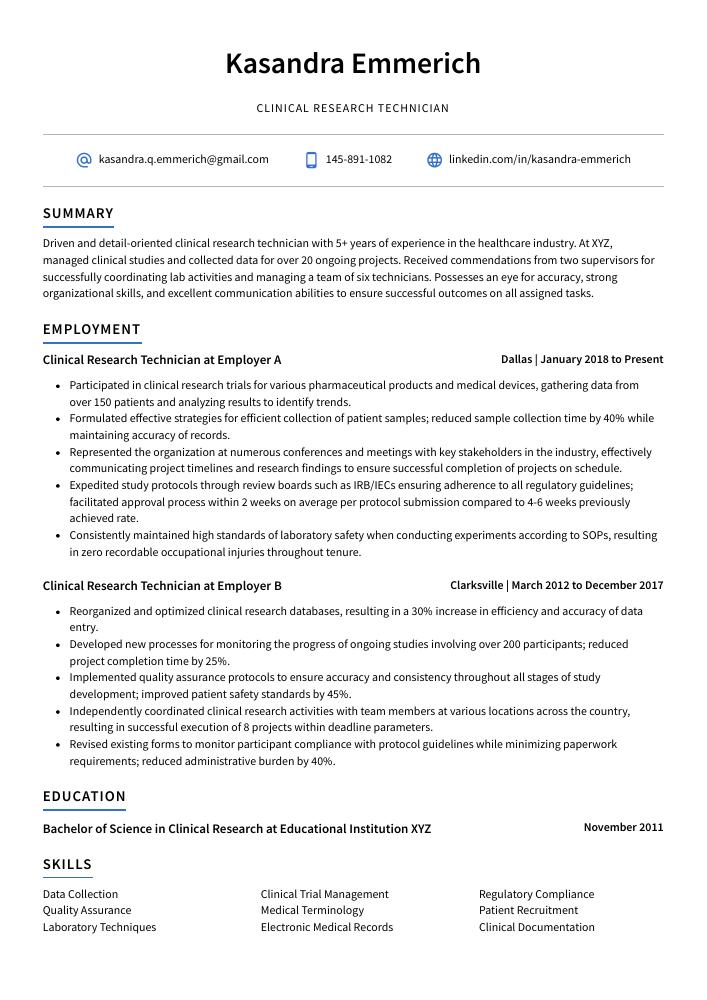Clinical Research Technician Resume Guide
Clinical Research Technicians are responsible for designing, conducting and monitoring clinical trials. They work closely with research teams to ensure that all protocols and regulations are followed, manage data collection processes, prepare reports on the progress of studies, and help develop documents related to trial activities.
Your knowledge of clinical research and laboratory techniques is unparalleled. However, potential employers don’t know you yet – to get them interested in your skillset, write a resume that stands out from the rest.
This guide will walk you through the entire process of creating a top-notch resume. We first show you a complete example and then break down what each resume section should look like.
Table of Contents
The guide is divided into sections for your convenience. You can read it from beginning to end or use the table of contents below to jump to a specific part.
Clinical Research Technician Resume Sample
Kasandra Emmerich
Clinical Research Technician
[email protected]
145-891-1082
linkedin.com/in/kasandra-emmerich
Summary
Driven and detail-oriented clinical research technician with 5+ years of experience in the healthcare industry. At XYZ, managed clinical studies and collected data for over 20 ongoing projects. Received commendations from two supervisors for successfully coordinating lab activities and managing a team of six technicians. Possesses an eye for accuracy, strong organizational skills, and excellent communication abilities to ensure successful outcomes on all assigned tasks.
Experience
Clinical Research Technician, Employer A
Dallas, Jan 2018 – Present
- Participated in clinical research trials for various pharmaceutical products and medical devices, gathering data from over 150 patients and analyzing results to identify trends.
- Formulated effective strategies for efficient collection of patient samples; reduced sample collection time by 40% while maintaining accuracy of records.
- Represented the organization at numerous conferences and meetings with key stakeholders in the industry, effectively communicating project timelines and research findings to ensure successful completion of projects on schedule.
- Expedited study protocols through review boards such as IRB/IECs ensuring adherence to all regulatory guidelines; facilitated approval process within 2 weeks on average per protocol submission compared to 4-6 weeks previously achieved rate.
- Consistently maintained high standards of laboratory safety when conducting experiments according to SOPs, resulting in zero recordable occupational injuries throughout tenure.
Clinical Research Technician, Employer B
Clarksville, Mar 2012 – Dec 2017
- Reorganized and optimized clinical research databases, resulting in a 30% increase in efficiency and accuracy of data entry.
- Developed new processes for monitoring the progress of ongoing studies involving over 200 participants; reduced project completion time by 25%.
- Implemented quality assurance protocols to ensure accuracy and consistency throughout all stages of study development; improved patient safety standards by 45%.
- Independently coordinated clinical research activities with team members at various locations across the country, resulting in successful execution of 8 projects within deadline parameters.
- Revised existing forms to monitor participant compliance with protocol guidelines while minimizing paperwork requirements; reduced administrative burden by 40%.
Skills
- Data Collection
- Clinical Trial Management
- Regulatory Compliance
- Quality Assurance
- Medical Terminology
- Patient Recruitment
- Laboratory Techniques
- Electronic Medical Records
- Clinical Documentation
Education
Bachelor of Science in Clinical Research
Educational Institution XYZ
Nov 2011
Certifications
Certified Clinical Research Technician (CCRT)
Society of Clinical
May 2017
1. Summary / Objective
Your resume summary should be a concise overview of your most relevant experience and qualifications as a clinical research technician. This is where you can highlight the technical skills that make you stand out, such as familiarity with laboratory equipment or experience in data analysis. You could also mention any certifications related to clinical research that you have obtained, and how your work has contributed to successful outcomes for patients.
Below are some resume summary examples:
Skilled clinical research technician with 5+ years of experience in clinical trial testing. Expertise includes patient monitoring, sample collection, data and document management. Focused on providing accurate results that adhere to Good Clinical Practice guidelines while maintaining a safe and ethical environment for patients. Seeking to join ABC Research Institute as the next CRT where I can apply my knowledge and skills towards successful studies.
Committed clinical research technician with 5+ years of experience in the pharmaceutical industry. Proven track record for designing and executing clinical trials, monitoring patient data, and reporting results to senior management. At XYZ Corp., managed a team of 10 technicians during an 18-month trial involving 50 participants across 3 states. Received recognition from peers for consistently delivering high-quality results on tight deadlines.
Talented clinical research technician with 5+ years of experience in the healthcare industry. Skilled at collecting, recording, and analyzing data to improve patient safety and satisfaction while meeting federal guidelines. Experienced in conducting clinical trials for medical devices and pharmaceuticals as well as preparing reports according to FDA requirements. Looking to leverage my knowledge and skillset towards joining ABC Research Labs.
Diligent and detail-oriented clinical research technician with 5+ years of experience collecting and organizing data for clinical trials. Seeking to join ABC Medical Research Institute and utilize expertise in medical terminology, regulatory compliance, and laboratory techniques to drive successful outcomes. Key achievement: improved accuracy of data entry by 32%, reducing the risk of errors that could cause costly delays or violations.
Detail-oriented clinical research technician with 4+ years of experience in a variety of clinical settings. Skilled at collecting and analyzing data, developing protocols for testing medical devices, and ensuring compliance to applicable standards. At XYZ Hospital, conducted over 1000 patient interviews/surveys on the effectiveness of new medications; results were used to improve care practices across multiple facilities.
Reliable clinical research technician with 8+ years of experience in conducting clinical trials and managing datasets. Seeking to join ABC company, utilizing expertise in patient care coordination, laboratory management, data analysis/reporting and regulatory compliance to ensure successful completion of projects. Proven track record of handling high-profile studies while maintaining strict adherence to safety protocols.
Seasoned clinical research technician with 7+ years of experience in the field. Skilled at administering clinical trials, collecting patient data, and preparing reports for both internal and external use. At XYZ Hospital, managed a team of five technicians to ensure that all protocols were followed correctly during studies. Received awards from senior management due to quality work on multiple projects.
Well-rounded clinical research technician with 3+ years of experience managing clinical studies and monitoring patient safety. Highly experienced in data collection, analysis, reporting, and compliance verification for medical trials. Seeking to join ABC Research Lab to utilize problem-solving skills and critical thinking abilities to support ongoing projects.
2. Experience / Employment
The employment (or experience) section is where you talk about your work history. It should be written in reverse chronological order, meaning the most recent job is listed first.
Stick to bullet points primarily when writing this section; doing so makes it easier for readers to take in what you have to say quickly. When writing each point, provide details on what you did and the results that were achieved as a result of your efforts.
For example, instead of saying “Collected data from clinical trials,” you could say: “Gathered detailed patient information from 10+ clinical trials per week using both paper-based and electronic records systems.”
To write effective bullet points, begin with a strong verb or adverb. Industry specific verbs to use are:
- Monitored
- Collected
- Assessed
- Analyzed
- Recorded
- Prepared
- Administered
- Processed
- Evaluated
- Managed
- Implemented
- Documented
- Investigated
- Tracked
Other general verbs you can use are:
- Achieved
- Advised
- Compiled
- Coordinated
- Demonstrated
- Developed
- Expedited
- Facilitated
- Formulated
- Improved
- Introduced
- Mentored
- Optimized
- Participated
- Presented
- Reduced
- Reorganized
- Represented
- Revised
- Spearheaded
- Streamlined
- Structured
- Utilized
Below are some example bullet points:
- Facilitated research projects to support clinical trials by collecting, organizing and analyzing data from patients; increased efficiency of documentation process by 10%.
- Prepared reports on the results obtained from patient studies, ensuring accuracy in all records while adhering to HIPAA regulations.
- Resourcefully developed new protocols for sample collection and preparation, resulting in a reduction of time spent per trial by 15 hours/week on average.
- Investigated potential issues that arose during laboratory experiments and resolved them effectively with minimal disruption to operations; reduced number of errors in experiment set-ups by 40%.
- Improved quality assurance processes through the implementation of updated safety procedures which helped reduce risk levels associated with research activities significantly.
- Streamlined patient recruitment process by 25%, enabling the completion of 3 clinical trials within 6 months.
- Introduced new protocols and processes to ensure accuracy, reliability and compliance with all applicable regulations; improved research quality standards by 15%.
- Spearheaded data collection efforts for 10+ studies involving over 200 patients, ensuring that all results were recorded in an accurate and timely manner.
- Managed a team of 5 clinical researchers while conducting daily laboratory experiments; oversaw day-to-day operations including training & scheduling activities for staff members + interns.
- Proficiently reviewed study documents such as patient records, consent forms, case report forms (CRFs), medical histories etc.; identified discrepancies & errors in order to keep data integrity intact at all times.
- Collected, compiled and analyzed clinical data from medical records, patient surveys, interviews and other sources; optimized the research process by reducing paperwork time by 25%.
- Mentored junior researchers on proper study protocol implementation; successfully trained 4 new technicians in laboratory safety procedures within a 3-month period.
- Thoroughly reviewed over 500 sets of clinical trial documents for accuracy prior to submission, increasing compliance with regulatory standards by 92%.
- Monitored participant eligibility requirements throughout all stages of the study according to FDA guidelines; reduced non-compliance incidents from 10% to 2%.
- Assisted in preparing reports summarizing findings after experiments were conducted and communicated results effectively with team members, resulting in 3 published papers accepted into high impact journals during tenure at company.
- Documented and reported clinical trial results accurately and in a timely manner; reduced data entry errors by 30%.
- Analyzed over 200 patient case studies, identified key trends to improve accuracy of research outcomes.
- Actively participated in training sessions for newly hired clinical staff members on the use of laboratory equipment and protocols with zero safety violations observed during tenure.
- Coordinated 10+ clinical trials with multi-disciplinary teams from various departments such as medical affairs, regulatory & compliance, biostatistics etc., ensuring successful completion within allocated budget and timeline constraints each time.
- Structured & maintained detailed records of all essential documents related to study protocol which enabled easy retrieval when needed; decreased paperwork processing time by 20 hours per month on average.
- Tracked and documented clinical trial data in accordance with GCP and FDA guidelines, achieving 100% accuracy during internal audits.
- Achieved up to 15% improvement in laboratory efficiency through optimized processes; prepared reports within budget & timelines specified by the client.
- Evaluated participants’ adherence to study protocol on a daily basis and reported any deviations promptly; identified risk factors that could affect outcomes of studies effectively.
- Effectively supervised 12 research assistants for day-to-day operations, ensuring high standards of safety were met throughout all activities conducted at the lab site(s).
- Reduced subject dropout rate from 20% to 5%, leading to significant cost savings for the employer over 3 consecutive months period ($15K+).
- Processed over 500 blood, tissue and other lab samples per week for clinical research studies; increased accuracy of results by 17%.
- Recorded patient medical histories, vital signs and test results accurately into study databases; ensured that all data entry was up-to-date within 24 hours.
- Presented complex research findings to a panel of experts in an organized manner at monthly meetings; reduced confusion during presentations by 50%.
- Reliably managed compliance with institutional policies, ethical guidelines and applicable government regulations pertaining to the conduct of clinical trials while collaborating with multi-disciplinary teams.
- Demonstrated excellent problem solving skills when troubleshooting technical issues related to laboratory equipment or software programs used in the course of studies; resolved on average 5 issues daily ahead of schedule targets.
- Monitored and documented clinical trial data of 30+ patients, ensuring compliance with protocol and accuracy in all research records; improved organization of patient files by 70%.
- Utilized various laboratory equipment to conduct tests on tissue samples collected from study participants and produced detailed reports for researchers.
- Assessed vital signs such as blood pressure, pulse rate, breathing pattern and temperature according to clinical protocols; reported any abnormalities or changes immediately to the supervising physician.
- Advised patients on their medication dosage levels during the course of the study period and provided additional information regarding potential side effects when needed; successfully completed 20+ studies in a year’s time frame without incident.
- Efficiently coordinated communication between research staff members through email correspondence & phone calls while keeping abreast with updates related to new medical treatments & therapies relevant to trials being conducted within departmental settings.
3. Skills
Skill requirements will differ from employer to employer – this can easily be determined via the job advert. Organization ABC may require the candidate to have experience with clinical trials, while Organization XYZ may want someone who is familiar with data analysis.
It is important to tailor the skills section of your resume for each job you are applying for; this will help ensure that it passes through any applicant tracking systems used by employers. These computer programs scan resumes for certain keywords and characteristics before passing them on to a human recruiter.
In addition to just listing relevant skills in this section, it’s also wise to discuss them further in other areas such as the summary or work experience sections.
Below is a list of common skills & terms:
- Clinical Documentation
- Clinical Trial Management
- Data Collection
- Electronic Medical Records
- Good Clinical Practice (GCP)
- Laboratory Techniques
- Medical Terminology
- Patient Recruitment
- Quality Assurance
- Regulatory Compliance
4. Education
Mentioning an education section on your resume will depend on how much experience you have in the field. If you are just starting out and don’t have any work history to showcase, include an education section below your resume objective. However, if you already have a few years of experience as a clinical research technician, it is not necessary to mention your education at all.
If including an educational background is important for this role, make sure to list courses related to clinical research that pertain directly to the job description.
Bachelor of Science in Clinical Research
Educational Institution XYZ
Nov 2011
5. Certifications
Certifications can be a great way to demonstrate your knowledge and expertise in certain areas. They can also show potential employers that you have taken the initiative to stay up-to-date on industry trends and best practices.
Including certifications on your resume is an excellent way to showcase any qualifications or specializations you may possess, as well as highlight any professional development courses you have completed. This will help make sure that hiring managers are aware of all the relevant skills and experience you bring to the table.
Certified Clinical Research Technician (CCRT)
Society of Clinical
May 2017
6. Contact Info
Your name should be the first thing a reader sees when viewing your resume, so ensure its positioning is prominent. Your phone number should be written in the most commonly used format in your country/city/state, and your email address should be professional.
You can also choose to include a link to your LinkedIn profile, personal website, or other online platforms relevant to your industry.
Finally, name your resume file appropriately to help hiring managers; for Kasandra Emmerich, this would be Kasandra-Emmerich-resume.pdf or Kasandra-Emmerich-resume.docx.
7. Cover Letter
A cover letter is a great way to showcase your personality and qualifications in more detail than what is included on your resume. It should be made up of 2 to 4 paragraphs and provide the hiring manager with an insight into who you are as a professional, why you’re passionate about the role and how you can contribute to their organisation.
Whilst cover letters aren’t always compulsory for job applications, they can make all the difference when it comes to competing against other candidates. This is because it gives recruiters an opportunity to get a better understanding of who you are beyond just facts listed on paper.
Below is an example cover letter:
Dear Yoshiko,
I am writing to apply for the clinical research technician position at XYZ Company. I am a recent graduate of ABC University with a degree in biology and have experience working in a medical laboratory.
In my previous job, I was responsible for conducting experiments, maintaining lab equipment, and keeping accurate records. These skills will be beneficial in this position as you will be required to perform similar duties. Additionally, my excellent communication and interpersonal skills will come in handy when interacting with patients and other staff members.
I am passionate about clinical research and hope to pursue a career in this field. I believe that XYZ Company is an excellent place to start my career as it is renowned for its cutting-edge research facilities. Moreover, the company’s strong emphasis on teamwork makes it an ideal environment for me to learn and grow professionally.
I would appreciate if you could contact me so that we can discuss this opportunity further. Thank you for your time and consideration.
Sincerely,
Kasandra
Clinical Research Technician Resume Templates
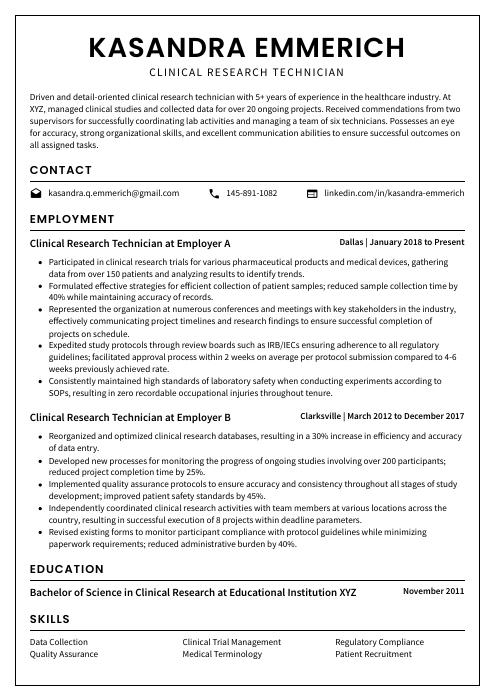 Cormorant
Cormorant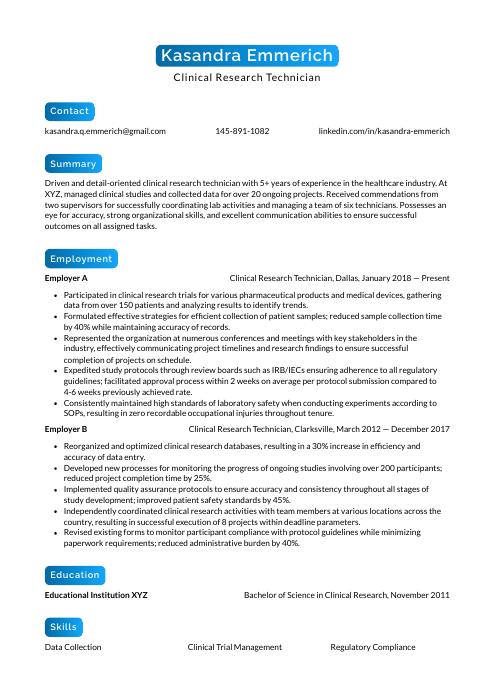 Kinkajou
Kinkajou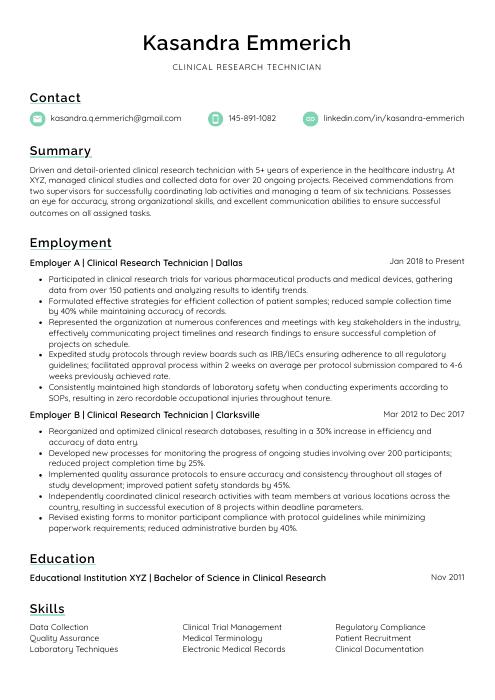 Lorikeet
Lorikeet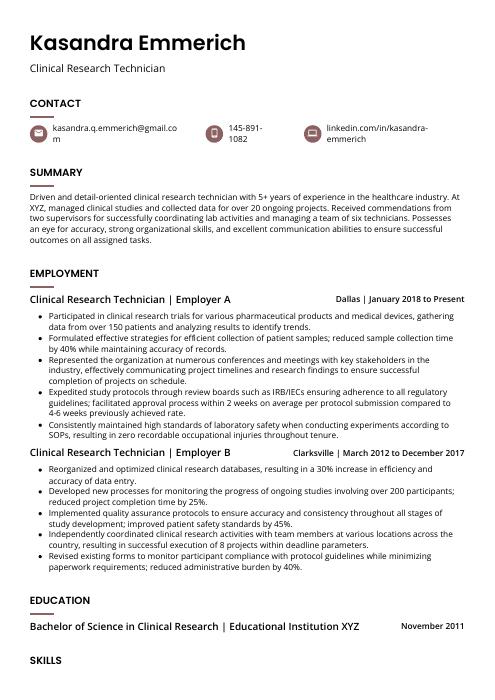 Fossa
Fossa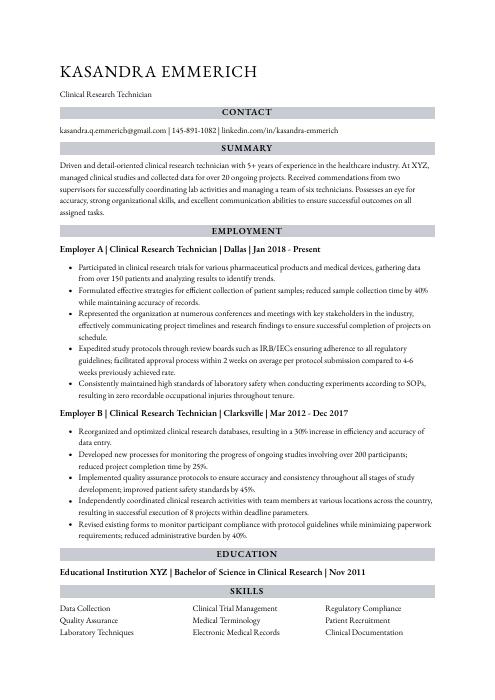 Numbat
Numbat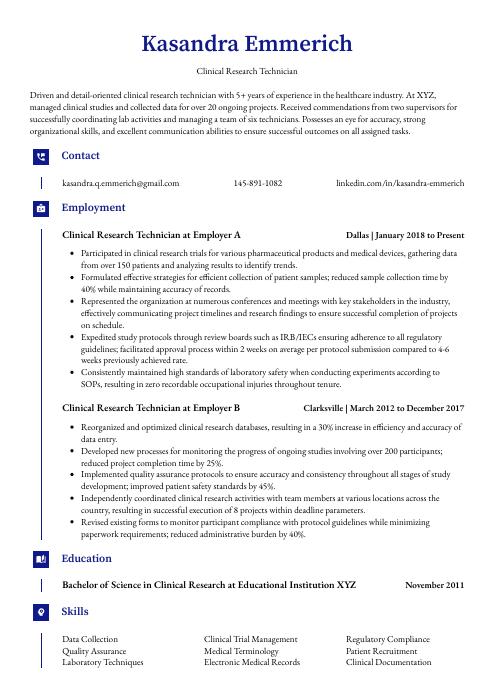 Gharial
Gharial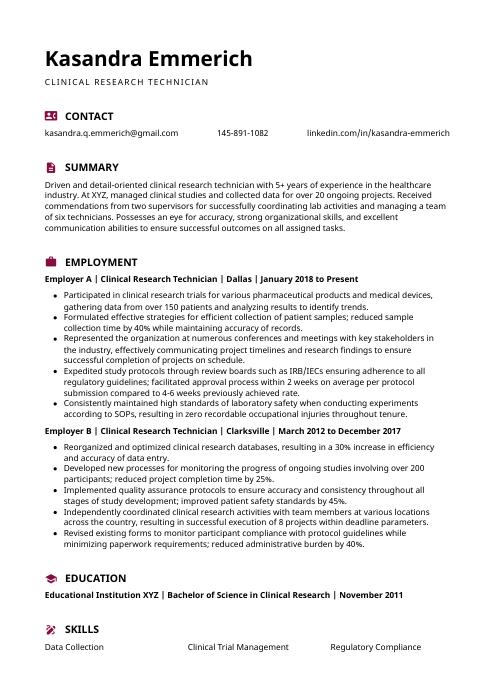 Hoopoe
Hoopoe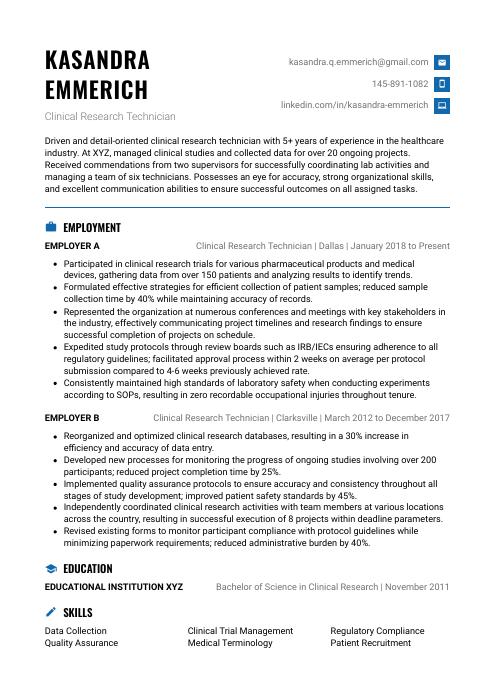 Echidna
Echidna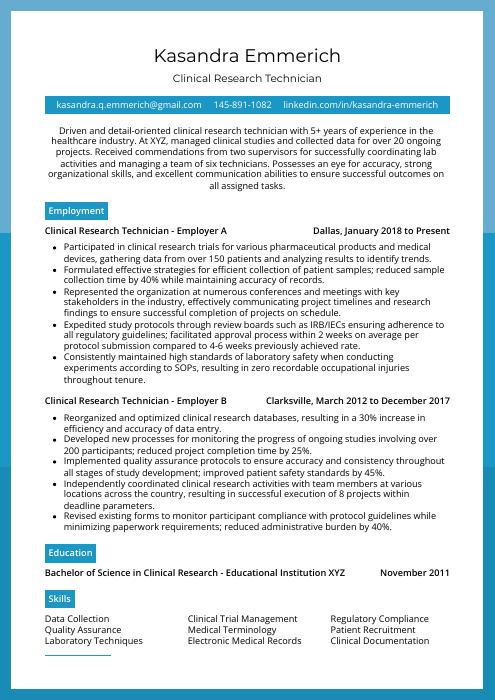 Rhea
Rhea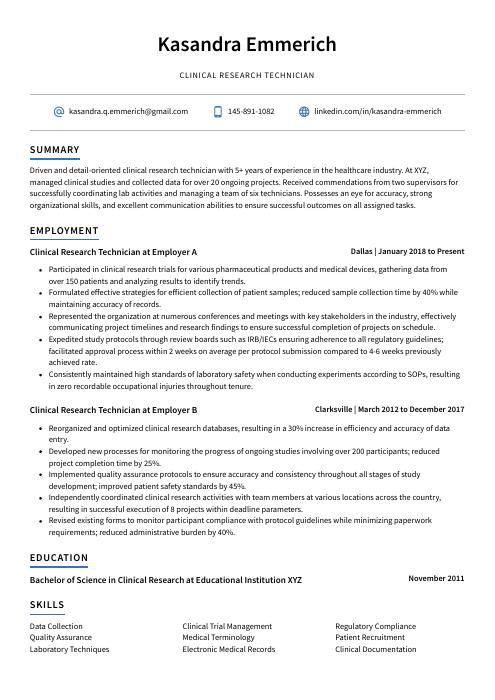 Axolotl
Axolotl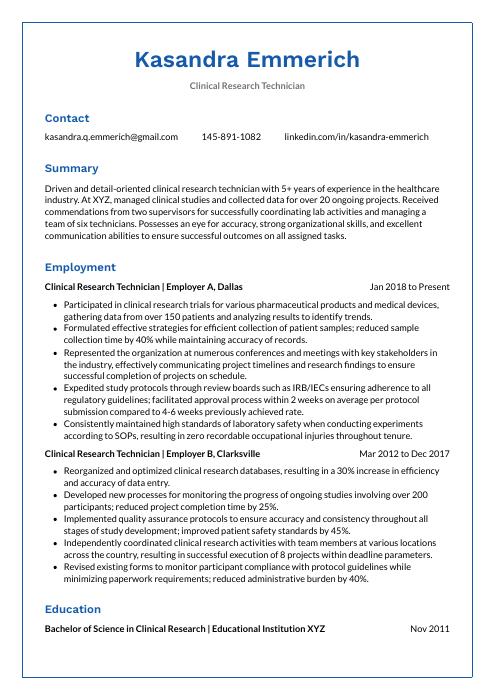 Markhor
Markhor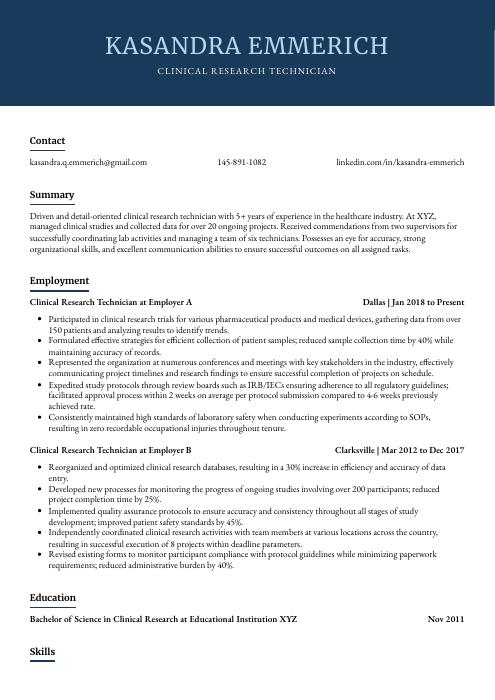 Bonobo
Bonobo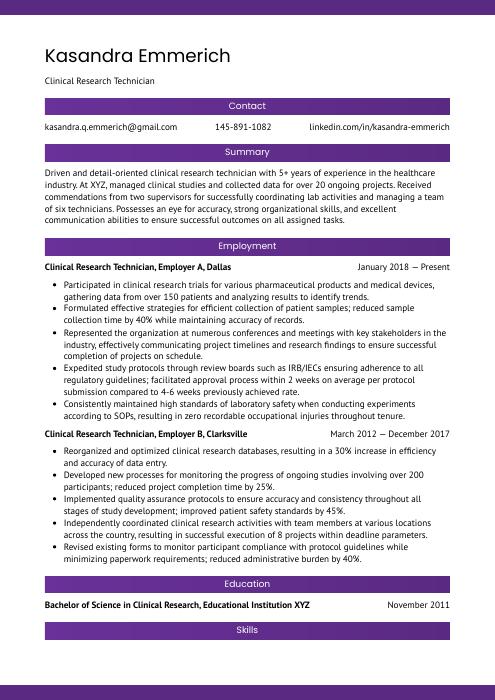 Jerboa
Jerboa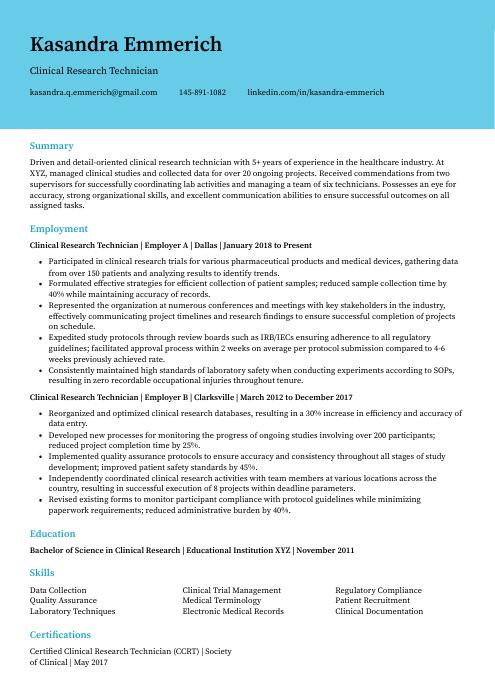 Dugong
Dugong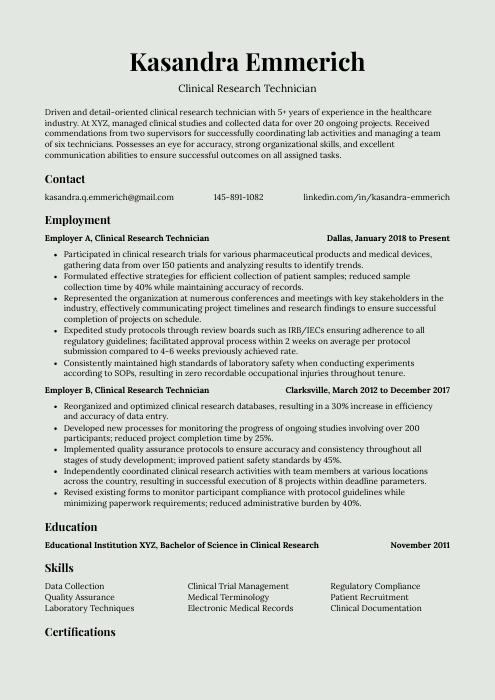 Saola
Saola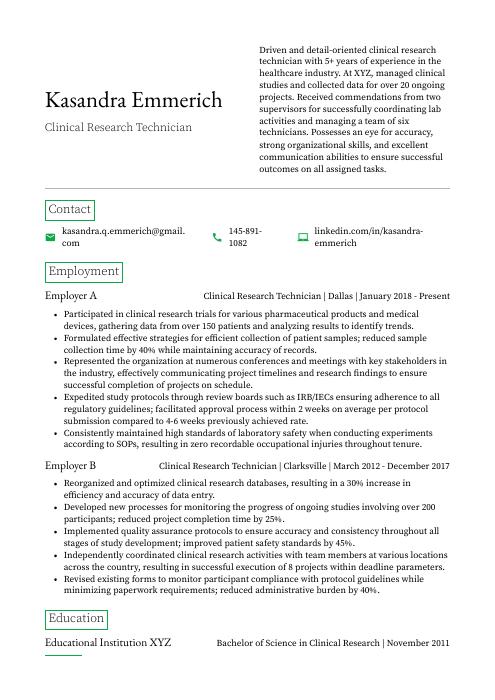 Quokka
Quokka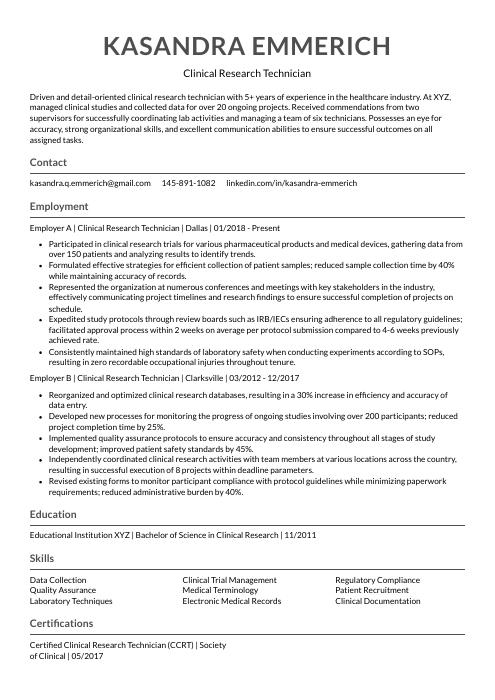 Indri
Indri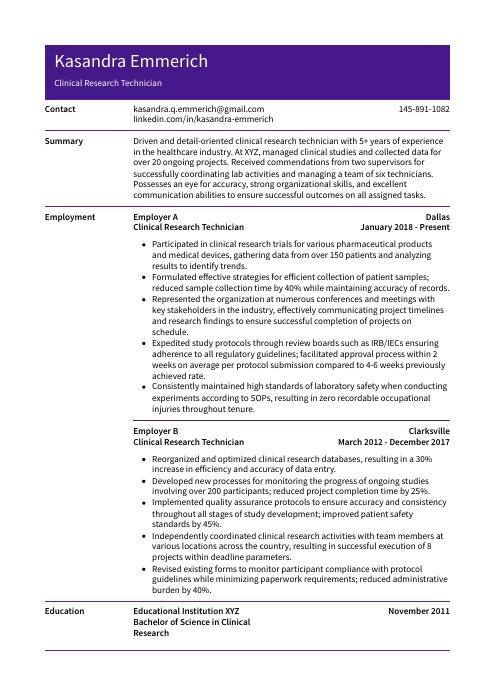 Pika
Pika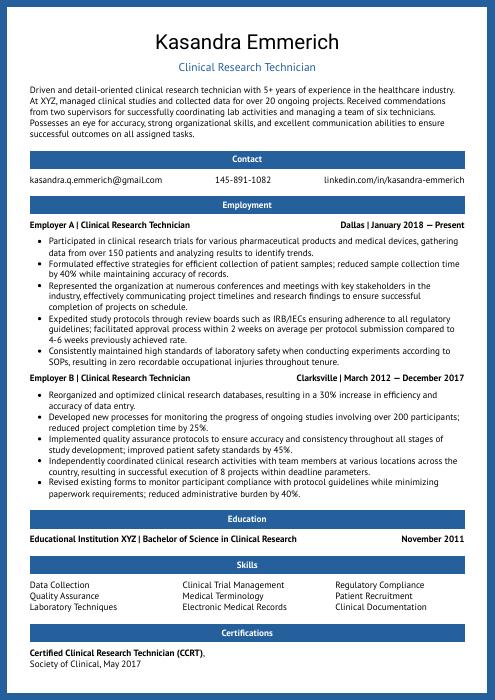 Ocelot
Ocelot Rezjumei
Rezjumei
